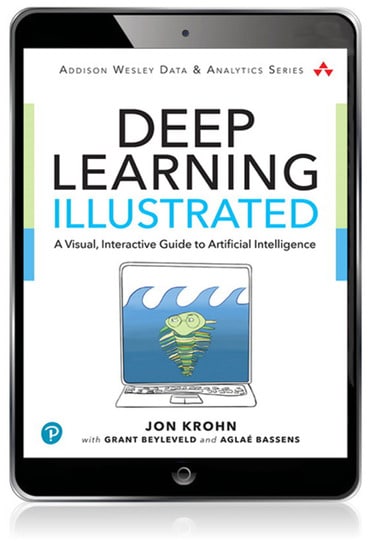
Deep Learning Illustrated: A Visual, Interactive Guide to Artificial Intelligence, 1st edition
Published by Addison-Wesley Professional (August 5, 2019) © 2020
- Jon Krohn
- Grant Beyleveld
- Aglaé Bassens
- Available for purchase from all major ebook resellers, including InformIT.com
- Available for purchase from all major ebook resellers, including InformIT.com
Title overview
Deep learning is one of today’s hottest fields. This approach to machine learning is achieving breakthrough results in some of today’s highest profile applications, in organizations ranging from Google to Tesla, Facebook to Apple. Thousands of technical professionals and students want to start leveraging its power, but previous books on deep learning have often been non-intuitive, inaccessible, and dry. In Deep Learning Illustrated, three world-class instructors and practitioners present a uniquely visual, intuitive, and accessible high-level introduction to the techniques and applications of deep learning. Packed with vibrant, full-color illustrations, it abstracts away much of the complexity of building deep learning models, making the field more fun to learn and accessible to a far wider audience.
Part I’s high-level overview explains what Deep Learning is, why it has become so ubiquitous, and how it relates to concepts and terminology such as Artificial Intelligence, Machine Learning, Artificial Neural Networks, and Reinforcement Learning. These opening chapters are replete with vivid illustrations, easy-to-grasp analogies, and character-focused narratives.
Building on this foundation, the authors then offer a practical reference and tutorial for applying a wide spectrum of proven deep learning techniques. Essential theory is covered with as little mathematics as possible and is illuminated with hands-on Python code. Theory is supported with practical "run-throughs" available in accompanying Jupyter notebooks, delivering a pragmatic understanding of all major deep learning approaches and their applications: machine vision, natural language processing, image generation, and videogaming.
To help readers accomplish more in less time, the authors feature several of today’s most widely used and innovative deep learning libraries, including TensorFlow and its high-level API, Keras; PyTorch; and the recently released, high-level Coach, a TensorFlow API that abstracts away the complexity typically associated with building Deep Reinforcement Learning algorithms.
